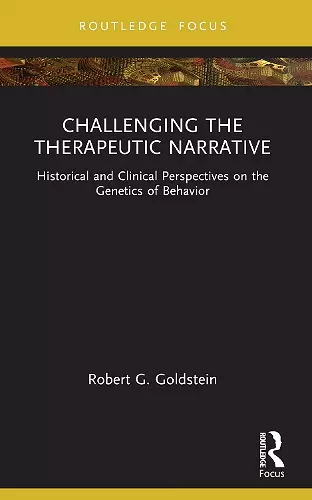Challenging the Therapeutic Narrative
Historical and Clinical Perspectives on the Genetics of Behavior
Format:Paperback
Publisher:Taylor & Francis Ltd
Published:26th Aug '24
Currently unavailable, and unfortunately no date known when it will be back

This volume explores and challenges the assumption that behavioral proclivities and pathologies are directly traceable to experience—an assumption that still widely dominates folk psychology as well as the perspective of many mental health practitioners. This tendency continues despite powerful evidence from the field of behavioral genetics that genetic endowment dwarfs other discrete influences on development and psychopathology when extrinsic conditions are not extreme.
An interdisciplinary collection, the book uses historical, cultural and clinical perspectives to challenge the longstanding notion of identity as the product of a life-narrative. Although the nativist-empiricist debate has been revivified by recent advances in molecular biology, such ideas date back to the Socratic dialogue on the innate mathematical sense possessed by an illiterate slave. The author takes a philosophical and historical approach in revisiting the writings of select figures from science, medicine, and literature whose insights into the potency of inherited factors in behavior were particularly prescient, and ran contrary to the modern declivity toward the self as narrative. The final part of the volume uses historical and clinical perspectives to help illuminate the elusive concept of innateness and highlights important ramifications of the revolution in behavioral genetics.
Seeking to challenge the clinical utility of the therapeutic narrative rather than the importance of experience per se, the book will ultimately appeal to psychiatrists, psychologists, and academics from various disciplines working across the fields of behavioral genetics, evolutionary biology, philosophy of science, and the history of science.
"This is an evolutionarily sophisticated book manuscript that I found very valuable."
-- John Alcock, Emeritus Professor, School of Life Sciences, Arizona State University
"This book is a refreshing counterpoint to the classical and still fashionable reliance on narrative biographical formulations in clinical psychiatry, that endure despite a century of countervailing behavioral neuroscience and genetics evidence. The author manages to entertain while tackling this complex topic."
--Albert HC Wong, Professor of Psychiatry, University of Toronto, Canada
"This was a difficult book for this clinical psychologist to read. Goldstein takes the view that human psychology is due primarily to genetic factors. What follows is a detailed explanation that downplays the role of personal experiences typically understood to impact human psychology. Psychotherapy is essentially described as a process that helps patients only in identifying their genetic proclivities and figuring out what to do about them. Readers who cite research supporting at least 50 percent of factors influencing behaviors that are non-heritable encounter a chapter titled "The Missing 50%," which argues that genetic and neurological factors do account for that missing 50 percent but just have not been identified yet. When reading this chapter, this reviewer was reminded of how Sigmund Freud, a neurologist, insisted that neurology would someday account for all aspects of psychology, including the unconscious; the science had just not caught up yet. In terms of providing a solid summary of research showing the genetic influence of behavior, this is an excellent text."
--D. C. Marston, Marston Psychological Services, LLC, CHOICE
"This is an evolutionarily sophisticated book manuscript that I found very valuable."
-- John Alcock, Emeritus Professor, School of Life Sciences, Arizona State University
"This book is a refreshing counterpoint to the classical and still fashionable reliance on narrative biographical formulations in clinical psychiatry, that endure despite a century of countervailing behavioral neuroscience and genetics evidence. The author manages to entertain while tackling this complex topic."
--Albert HC Wong, Professor of Psychiatry, University of Toronto, Canada
"This was a difficult book for this clinical psychologist to read. Goldstein takes the view that human psychology is due primarily to genetic factors. What follows is a detailed explanation that downplays the role of personal experiences typically understood to impact human psychology. Psychotherapy is essentially described as a process that helps patients only in identifying their genetic proclivities and figuring out what to do about them. Readers who cite research supporting at least 50 percent of factors influencing behaviors that are non-heritable encounter a chapter titled "The Missing 50%," which argues that genetic and neurological factors do account for that missing 50 percent but just have not been identified yet. When reading this chapter, this reviewer was reminded of how Sigmund Freud, a neurologist, insisted that neurology would someday account for all aspects of psychology, including the unconscious; the science had just not caught up yet. In terms of providing a solid summary of research showing the genetic influence of behavior, this is an excellent text."
--D. C. Marston, Marston Psychological Services, LLC, CHOICE
ISBN: 9781032398747
Dimensions: unknown
Weight: 249g
124 pages